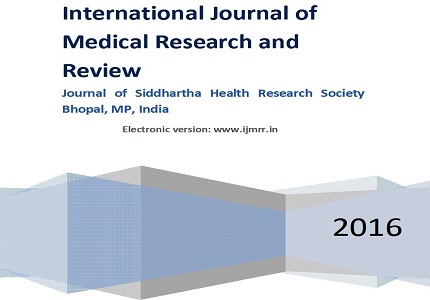Central line associated Bloodstream Infections
Keywords:
Central line associated blood stream infection, nosocomial infection, bacteremia
Abstract
Catheter associated blood stream infections are common entity in ICU setting. Indeed it is having 1-13 % prevalence rate in various studies.
Downloads
Download data is not yet available.
References
1. Sadoyama G, Gontijo Filho PP. Comparison between the jugular and subclavian vein as insertion site for central venous catheters: microbiological aspects and risk factors for colonization and infection. Braz J Infect Dis. 2003 Apr;7(2):142-8. [PubMed]
2. Frasca D, Dahyot-Fizelier C, Mimoz O. Prevention of central venous catheter-related infection in the intensive care unit. Crit Care. 2010;14(2):212. [PubMed]
3. Nahum E, Levy I, Katz J, Samra Z, Ashkenazi S, Ben-Ari J, et al. Efficacy of subcutaneous tunneling for prevention of bacterial colonization of femoral central venous catheters in critically ill children. Pediatr Infect Dis J. 2002 Nov;21(11):1000-4. [PubMed]
4. Subha Rao S, Joseph M, Lavi R, Macaden R. Infections related to vascular catheters in a pediatric intensive care unit. Indian Pediatr. 2005 Jul;42(7):667-72. [PubMed]
5. Costello JM, Graham DA, Morrow DF, Potter-Bynoe G, Sandora TJ, Laussen PC. Risk factors for central line-associated bloodstream infection in a pediatric cardiac intensive care unit. Pediatr Crit Care Med. 2009 Jul;10(4):453-9. doi: 10.1097/PCC.0b013e318198b19a. [PubMed]
6. Vilela R, Jácomo AD, Tresoldi AT. Risk factors for central venous catheter related infections in pediatric intensive care. Clinics (Sao Paulo). 2007 Oct;62(5):537-44. [PubMed]
7. Safdar N, Kluger DM, Maki DG. A review of risk factors for catheter-related bloodstream infection caused by percutaneously inserted, non cuffed central venous catheters: implications for preventive strategies. Medicine (Baltimore). 2002;81(6):466-79. [PubMed]
8. Eggimann P, Sax H, Pittet D. Catheter-related infections. Microbes Infect. 2004 Sep;6(11):1033-42. [PubMed]
9. L. Silvia Munoz-Price, Cameron Dezfulian, Mary Wyckoff, Joshua D. Lenchus, Mara Rosalsky, David J. Birnbach, Kristopher L. Arheart. Effectiveness of stepwise interventions targeted to decrease central catheter-associated bloodstream infections. Crit Care Med 2012; 40(5): 1464–1469. doi:10.1097/CCM.0b013e31823e9f5b.
10. Oberai L, Pallavi P, Chatrath V, Devi P. Microbial profile and risk factors of central venous catheter associated blood stream infections in Tertiary Care Hospital, Amritsar. Int J Med Res Rev 2016;4(8):1437- 1442.doi:10.17511/ijmrr.2016.i08.26.
2. Frasca D, Dahyot-Fizelier C, Mimoz O. Prevention of central venous catheter-related infection in the intensive care unit. Crit Care. 2010;14(2):212. [PubMed]
3. Nahum E, Levy I, Katz J, Samra Z, Ashkenazi S, Ben-Ari J, et al. Efficacy of subcutaneous tunneling for prevention of bacterial colonization of femoral central venous catheters in critically ill children. Pediatr Infect Dis J. 2002 Nov;21(11):1000-4. [PubMed]
4. Subha Rao S, Joseph M, Lavi R, Macaden R. Infections related to vascular catheters in a pediatric intensive care unit. Indian Pediatr. 2005 Jul;42(7):667-72. [PubMed]
5. Costello JM, Graham DA, Morrow DF, Potter-Bynoe G, Sandora TJ, Laussen PC. Risk factors for central line-associated bloodstream infection in a pediatric cardiac intensive care unit. Pediatr Crit Care Med. 2009 Jul;10(4):453-9. doi: 10.1097/PCC.0b013e318198b19a. [PubMed]
6. Vilela R, Jácomo AD, Tresoldi AT. Risk factors for central venous catheter related infections in pediatric intensive care. Clinics (Sao Paulo). 2007 Oct;62(5):537-44. [PubMed]
7. Safdar N, Kluger DM, Maki DG. A review of risk factors for catheter-related bloodstream infection caused by percutaneously inserted, non cuffed central venous catheters: implications for preventive strategies. Medicine (Baltimore). 2002;81(6):466-79. [PubMed]
8. Eggimann P, Sax H, Pittet D. Catheter-related infections. Microbes Infect. 2004 Sep;6(11):1033-42. [PubMed]
9. L. Silvia Munoz-Price, Cameron Dezfulian, Mary Wyckoff, Joshua D. Lenchus, Mara Rosalsky, David J. Birnbach, Kristopher L. Arheart. Effectiveness of stepwise interventions targeted to decrease central catheter-associated bloodstream infections. Crit Care Med 2012; 40(5): 1464–1469. doi:10.1097/CCM.0b013e31823e9f5b.
10. Oberai L, Pallavi P, Chatrath V, Devi P. Microbial profile and risk factors of central venous catheter associated blood stream infections in Tertiary Care Hospital, Amritsar. Int J Med Res Rev 2016;4(8):1437- 1442.doi:10.17511/ijmrr.2016.i08.26.

CITATION
DOI: 10.17511/ijmrr.2016.i08.37
Published: 2016-08-31
How to Cite
1.
Chandran R, Gedam DS. Central line associated Bloodstream Infections. Int J Med Res Rev [Internet]. 2016Aug.31 [cited 2025Sep.5];4(8):1290-1. Available from: https://ijmrr.medresearch.in/index.php/ijmrr/article/view/643
Section
Editorial


 OAI - Open Archives Initiative
OAI - Open Archives Initiative


